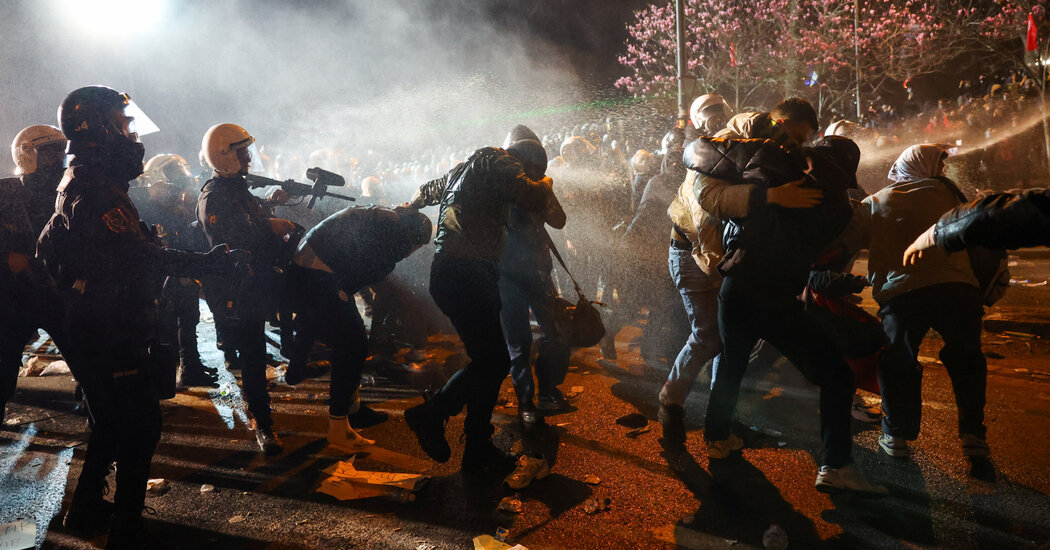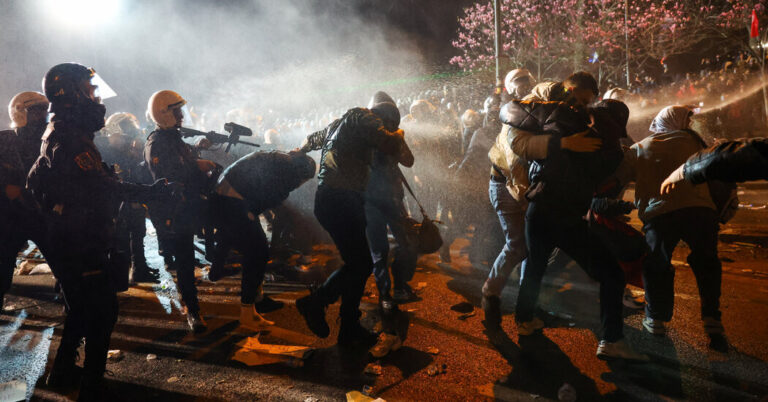The largest opposition party of Türkiye is organizing events, exhorting boycotts of pro-government companies and standing by his presidential candidate, even if he will have to campaign from prison.
In universities, students have made advice to direct protests and spread the voice, sharing suggestions to face the anti -Somamossa Police and tear gas. Their efforts – part of the largest wave of political protests in Türkiye in more than a decade – were catalyzed by the arrest of the government of Ekrem Imamoglu, the mayor of Istanbul and the president Recep Tayyip Erdogan.
They were accepted with measures equally vast by the government of Mr. Erdogan to cancel them. But instead of frameing opposition supporters, repression seems to energize them.
“Everyone in the forums and meetings say that it is not just imamoglu,” said Irem Tacildiz, 24 years old, an economics student at the Middle East Technical University in the capital, Ankara, who participated in the protests. “The fire is already on.”
But it is not clear to what extent the nascent protest movement can support its momentum and be able to persuade or force the government to change course.
The government removed Mr. Imamoglu from his assignment and imprisoned him on Sunday awaiting trial with accusations of corruption. On the same day, his political party chose him as a candidate in the next presidential elections.
His university also canceled his diploma, citing improper procedures more than three decades ago, which actually blocked him from the presidential tender because the candidates must have completed higher education.
Mr. Imamoglu denied the accusations and promised to fight them in court. The opposition defined its arrest as a “coup d’état” aimed at blocking a challenge to Mr. Erdogan.
Turkey is officially a democratic republic, but foreign officials, experts and many Turks say that in recent years Mr. Erdogan has pushed the country towards autocracy and is now trying to further consolidate his power. This means that the Turks who try to resist the government must deal with the control of Mr. Erdogan on security forces and the influence in the media and courts, analysts say.
“The authoritarian side is becoming stronger and at every step, the areas for the struggle in which the opposition can express its positions and talk about injustices are becoming closer,” said Seren Selvin Korkmaz, Co-manager of Istanpol, a Think Tank based in Istanbul. “So the opposition must always find creative solutions to express their positions to the people”.
The news of the arrest of Mr. Imamoglu led to great night protests in front of the Town Hall of Istanbul and other Turkish cities. The police have freed many of them by force.
To lead the opposition is the Republican Popular Party, or CHP, to which Mr. Imamoglu belongs. The reverse founder of Türkiye, Mustafa Kemal Ataturk, represents a firmly secular government and mostly draws on its support from the largest coastal cities.
His most public face was his leader, Ozgur Ozel, a pharmacist and legislator known for his alterations with members of the party of justice and development in the power of Erdogan in Parliament. After the arrest of Mr. Imamoglu, he took the residence in a room in the town hall with a small bed to coordinate the party’s response, keeping fiery night speeches to the protesters.
He asked to boycott the companies related to the pro-government news channels that had not filmed the demonstrations.
“A boycott is coming for anyone who ignored this square,” he shouted during an address on Sunday, his Rauca voice. “We will use the power of our consumption.”
On Friday in an interview, Gokhan Gunaydin, a high party official, said he would push for the first presidential elections while trying to channel what he called a wider discontent with the “clear anti -democratic thrust” by the government.
The party planned to stay with Mr. Imamoglu, he said, even if this meant that the prison became his “office of the presidential campaign”.
The party would have fought the accusations against the mayor, his helpers and other party officials and contained the cancellation of his diploma, he said. It would go on with the boycott and would organize the regular gatherings to support Mr. Imamoglu around Istanbul and elsewhere in the country.
Many demonstrators are university students who express anger for the way Erdogan managed the country and worried about the restrictions on civil rights.
Initially, the students of her university had been surprised by the hard response of the police, said Mrs. Tacildiz, the economy student. So they organized precautions: antigas masks, asthma and antacid drugs, which can counteract the effects of tear gas. A university research and rescue club took volunteer to help whether the demonstrators were wounded.
Many of his friends were arrested and the police were patrolling his bourgeois campus and using drones to trace protests, he said. Some demonstrators wore masks to prevent the police from identifying them.
Students are wary of courts and feel anxious to where the country is directed, he said.
The government has issued deck prohibitions on public demonstrations and closed transit hubs and the anti -Somamossa police dispersed the protesters with water cannons, tear gas and pepper spray. More than 1,800 people have been arrested and about 260 imprisoned pending trial, according to the Ministry of the Interior.
The pro-government news, many owned by the allies of Mr. Erdogan have avoided live broadcasts of the protests, dedicating a substantial transmission time to the accusations against Mr. Imamoglu.
Thursday, a parliamentary committee that regulates the media suspended an opposition broadcaster, Szc TV, for 10 days after having accused him of “inciting the public to hatred and hostility”, according to a declaration on his website.
Three other pro-opposition channels were also fined for showing Mr. Ozel, leader of the opposition party, who criticized the state prosecutor who ordered the arrest of the mayor, wrote a member of the opposition of the Committee on social media.
Erdogan rejected the demonstrators as violent vandals and accused the opposition of feeding chaos on the streets to avoid facing the accusations of corruption against its members.
Thursday, the Minister of Justice Yilmaz Tunc insisted with the journalists that the courts were independent and criticized the attempts to reject the investigations on Mr. Imamoglu as a politician.
“This investigation is conducted entirely by independent judicial bodies and when the investigative authorities become aware of these accusations, it would be unthinkable in order not to open an investigation,” he said.
He denied any relationship between the appointment of Mr. Imamoglu to apply for the presidency and his detention.
“This is not linked to its application process or other developments,” he said.
The next elections of Türkiye are scheduled for 2028, but many Turks predict that Parliament ask for early elections in which Mr. Erdogan, 71 years old, could potentially run against Mr. Imamoglu, 54 years old.
Osman Sert, director of Panoramatr, a research institute in Ankara, said that Imamoglu’s arrest had a “gathering around the effect of the flag” that helped unite the opposition.
However, he said, he faced a government with great power that would have been a challenge to face.
“Turkey is not yet in a position in which democracy is already suspended and completely canceled. But these are obviously the most difficult days for democracy,” he said. “These are the rules of the game and you can’t get out of it.”





